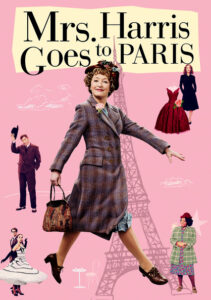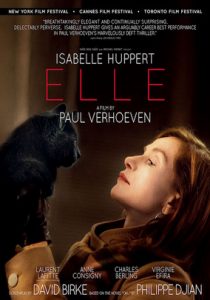Mrs. Harris Goes to Paris-2022
Director Anthony Fabian
Starring Lesley Manville, Isabelle Huppert
Scott’s Review #1,301
Reviewed September 24, 2022
Grade: B+
Mrs. Harris Goes to Paris (2022) is an endearing film enveloping the viewer in warmth and good cheer. It exudes empathy and heart while sprinkling in some good luck, chance, and a big dream.
It shows that, every once in a while, a reasonable person prevails in life.
It is the third film adaptation of the 1958 novel Mrs. Arris Goes to Paris, written by Paul Gallico. Angela Lansbury played the role in an earlier incarnation.
British actress Lesley Manville stars in the film as the title role. A talented cast surrounds her, delivering good performances, notably from the legendary French actress Isabelle Huppert in the role of the foil.
Unsurprisingly, in a film where good fortunes are the theme of the day, even she comes around in the end, though, where most characters dutifully assist in the ultimate happiness of Mrs. Harris.
There is drama encircling this film, but in the lightest of ways. The comedy elements pair well, and the romanticism aligned with Paris is palpable, as seen in other characters like young lovebirds André (Lucas Bravo), the Dior accountant, and Natasha (Alba Baptista), a Dior model, who find love for each other.
Everyone gets a happy ending.
It all begins in 1957 London, where Ada Harris, a widowed cleaning lady, becomes obsessed with one client’s haute couture Dior dress. She is impulsively inspired to buy her Dior dress one day. However, finding the money is the biggest challenge.
As fate would have it, she suddenly receives a war widow’s pension and travels to Paris to buy her dress. She stumbles into a showing of Dior’s 10th-anniversary collection and is befriended by André and Natasha.
However, the Dior director, Claudine (Huppert), resents Ada’s intrusion into the exclusive world of haute couture and schemes to prevent her purchase.
Director Anthony Fabian, who is very new to directing, wisely provides a hefty dose of the British way of living, counterbalanced with the glamour of the Parisian lifestyle that works. The character, and thus the viewer, alternates between London and Paris.
The film is a safe experience and will not ruffle even the slightest of feathers or the tightest of asses.
It’s all pure, silly fantasy, of course, but done in the best possible way.
I was immediately immersed in the film and instantly wanted to champion happiness for Ada.
Manville is perfectly cast, though I could easily see other actresses in the role. Imelda Staunton, Emma Thompson, or Helen Mirren would have been terrific. Taking nothing away from Manville, who’s got charisma and acting chops, it’s a role that others could also successfully play.
I can’t say the same for Claudia’s role. At the risk of merely being a throwaway role as the heavy, Huppert, whom I adore in films like Amour (2012) and Elle (2016), instead brings her from a full-on bitch to a sympathetic character.
Huppert is one of the greatest actresses in the world and can and has made the most despicable characters worthy. That’s tough to do.
Naturally, there is a hefty dose of exterior scenes that I find pleasing. Having visited both Paris and London, as well as the surrounding areas, it’s lovely and reminiscent to catch glimpses of the Eiffel Tower or see cobblestone streets lined with bakeries or pubs.
The musical score is fresh and atmospheric, especially during the Parisian sequences. Boisterous and cultured French music emerges from the screen.
Besides all of the pleasant trimmings, romance blossoms for Ada as well as the youngsters. Encouraged to find the love she thinks she might have with the rich and sophisticated Marquis de Chassagne (Lambert Wilson), who takes a shine to her.
But when he awkwardly tells her she reminds him of his childhood nanny, she is crushed.
I secretly enjoyed this heartbreak only because I was never convinced Ava truly belonged in that world daily.
True to form, the filmmakers teeter towards a setup between Ava and regular, beer-drinking, local friend Archie (Jason Isaacs).
Box-office receipts will likely determine whether Mrs. Harris Goes to Paris (2022) receives a sequel. But I’ll be keen to follow this richly drawn character as she lands in New York City or other interesting geographies.
Oscar Nominations: Best Costume Design




